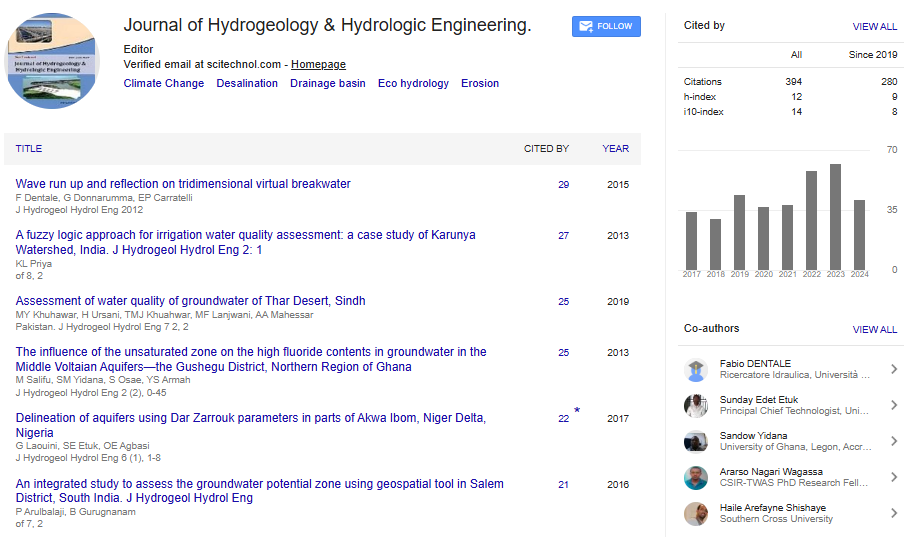Commentary, J Hydrogeol Hydrol Eng Vol: 13 Issue: 1
Watershed Management: A Comprehensive Approach to Sustainable Water Resource Management
Junbao Yu*
1Department of Geography, The University of Burdwan, West Bengal, India
*Corresponding Author: Junbao Yu,
Department of Geography, The University of Burdwan, West Bengal, India
E-mail: yujunbao@gmail.com
Received date: 22 January, 2024, Manuscript No. JHHE-24-132068;
Editor assigned date: 24 January, 2024, PreQC No. JHHE-24-132068 (PQ);
Reviewed date: 08 February, 2024, QC No. JHHE-24-132068;
Revised date: 16 February, 2024, Manuscript No. JHHE-24-132068 (R);
Published date: 23 February, 2024, DOI: 10.4172/2325-9647.1000305
Citation: Yu J (2024) Watershed Management: A Comprehensive Approach to Sustainable Water Resource Management. J Hydrogeol Hydrol Eng 13:1.
Description
Watersheds are precarious ecological structures that play a vital role in maintaining the Earth's water cycle, supporting biodiversity, and providing essential ecosystem services to human populations. However, human activities such as deforestation, land conversion, and water extraction have resulted in degradation and degradation of watersheds worldwide, posing significant threats to water quality, aquatic ecosystems, and downstream communities. In this article, we will explore the concept of holistic watershed management and its importance in maintaining the health and sustainability of our water resources.
What is holistic watershed management?
Holistic watershed management is an integrated approach to managing water resources that considers the entire watershed as a single, interconnected system. This approach recognizes the interdependence of all components of the watershed; including land use practices, vegetation, soil, water, and aquatic ecosystems, and seeks to manage these components in a way that maintains their integrity and sustainability.
The goal of holistic watershed management is to promote a strategic balance between ecological, social, and economic needs, ensuring that water resources are managed in a way that benefits both people and the environment. This approach is based on the recognition that watersheds are complex systems that cannot be managed in isolation, but rather require a comprehensive, systems-level approach to ensure long-term sustainability.
Importance of holistic watershed management:
Holistic watershed management is essential for maintaining the health and sustainability of our water resources for several reasons:
Maintains water quality: Holistic watershed management helps to maintain the integrity of aquatic ecosystems by ensuring that water is managed in a way that promotes water quality. This includes protecting riparian zones, implementing best management practices for land use and agriculture, and reducing pollutants from point and non-point sources.
Supports biodiversity: Watersheds are hotspots of biodiversity, with unique and diverse ecosystems that support a wide range of plant and animal species. Holistic watershed management helps to protect and conserve these ecosystems, ensuring that they continue to provide important ecosystem services and support biodiversity.
Provides essential ecosystem services: Watersheds provide essential ecosystem services, including water supply, flood protection, and sediment regulation. Holistic watershed management helps to maintain these services, ensuring that they are available for present and future generations.
Supports human health: Watersheds are precarious for human health, as they provide clean water for drinking, cooking, and hygiene. Holistic watershed management helps to protect water sources and promote safe drinking water practices, reducing the risk of waterborne diseases.
Facilitates climate change adaptation: Holistic watershed management helps to promote resilience in the face of climate change by adapting ecosystems and water infrastructure to changing conditions. This includes implementing climate-resilient land use practices, protecting natural habitats, and promoting water storage and management systems that can withstand extreme weather events.
Sustainable water resource management practices
Holistic watershed management requires a range of sustainable water resource management practices, including:
Integrated water resource management: This approach recognizes that water is a shared resource that must be managed in a comprehensive and coordinated manner, taking into account the needs of all stakeholders.
Water conservation: Conservation of water sources is precarious to ensure long-term sustainability, including reducing water consumption through efficient practices in agriculture, industry, and domestic use.
Water harvesting and storage: Harvesting and storing water in wetlands, reservoirs, and other water storage systems can help to mitigate the impacts of droughts and floods, improving water security and food security.
Ecosystem restoration: Restoring degraded ecosystems, including wetlands, forests, and riverbanks, can help to improve water quality, support biodiversity, and enhance ecosystem services.
Community engagement and participation: Engaging communities in watershed management can help to promote ownership and stewardship, ensuring that local perspectives and knowledge are integrated into decision-making processes.
 Spanish
Spanish  Chinese
Chinese  Russian
Russian  German
German  French
French  Japanese
Japanese  Portuguese
Portuguese  Hindi
Hindi 
